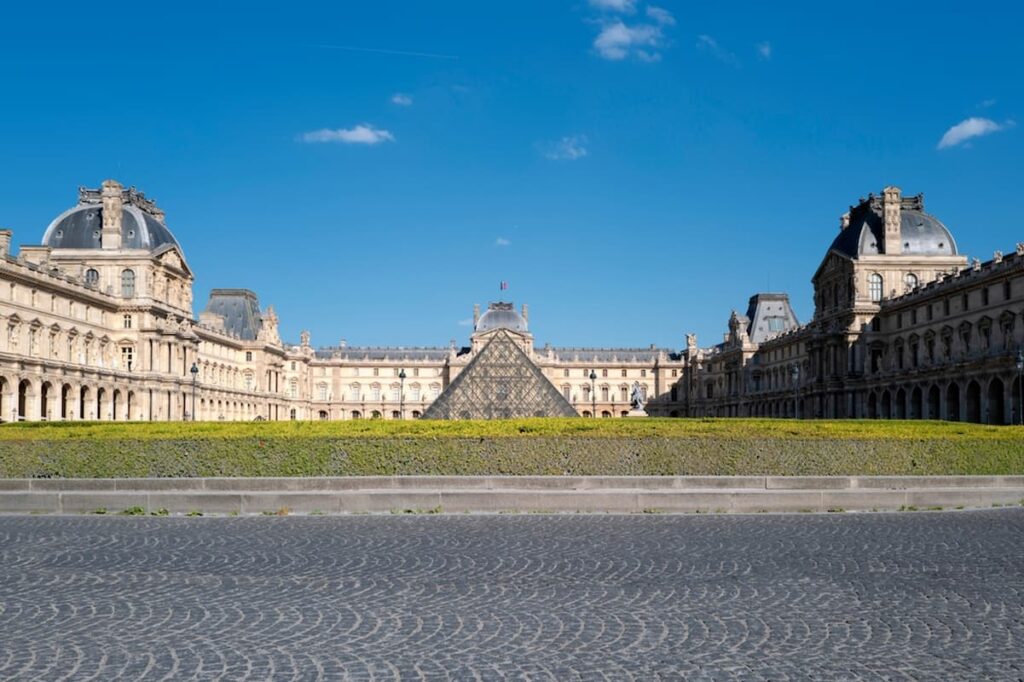Government Admits Failure as Investigation Widens
France’s justice minister Gérald Darmanin acknowledged Monday that the country’s authorities “failed” to prevent the brazen theft of priceless royal jewellery from the Louvre Museum, calling the incident a national humiliation. The admission came as police intensified their hunt for four suspects behind one of the most audacious art crimes in recent French history.
The burglars struck early Sunday morning, using a truck platform to access the museum’s first floor and seize eight historic pieces — including necklaces, brooches, and diadems once belonging to 19th-century queens and empresses. Among the stolen items were an emerald necklace and earrings worn by Empress Marie-Louise, Napoleon Bonaparte’s second wife.
“They parked a furniture hoist in the middle of Paris and got people up it in several minutes to grab priceless jewels,” Darmanin said. “What is certain is that we have failed.”
Priceless Heritage Under Threat
The heist has renewed scrutiny of museum security across France. Interior minister Laurent Nunez has ordered a nationwide review of safety measures at cultural institutions, with instructions to strengthen them immediately where needed.
The thieves also attempted to steal the crown of Empress Eugénie, wife of Napoleon III, but dropped it while fleeing. The headpiece — adorned with 1,354 diamonds and 56 emeralds — was later recovered damaged outside the museum. Paris prosecutors confirmed that a jacket, equipment, and a bottle of liquid left behind by the suspects are being analyzed for DNA and chemical traces.
The Louvre, which welcomes nearly nine million visitors annually, remained closed for a second day on Monday as investigators combed the Apollo Gallery, where the theft took place. The incident has deeply shaken public confidence in France’s ability to safeguard its cultural heritage.
President Emmanuel Macron, who recently announced an €800 million renovation plan for the museum that included enhanced security systems, called the theft “an attack on a heritage that we cherish because it is our history.”
Security Gaps and Political Fallout
A leaked report from France’s state auditor, the Cour des comptes, suggested that parts of the Louvre remain without proper surveillance technology, citing “persistent delays” in deploying modern protection systems. The revelation has fueled criticism of the government’s handling of national treasures.
Far-right leader Jordan Bardella called the burglary “an unbearable humiliation,” accusing the government of presiding over the “crumbling of the state.” Conservative deputy Éric Ciotti added, “When the state no longer guarantees the security of its treasures, the entire nation is under threat.”
Former president François Hollande, however, urged restraint and cooperation rather than political division. He called for a stronger crackdown on international criminal networks that traffic in stolen art and even raised the possibility that foreign actors could have ordered the heist to “destabilize” France.
National Shock and Cultural Symbolism
For many in France, the theft struck a deeply emotional chord. Darmanin compared the public reaction to the 2019 Notre-Dame fire, noting that even those who are not art enthusiasts feel a collective loss. “Having jewels stolen from the Louvre in such an extraordinary way hurts and gives a very negative image of France,” he said.
The government now faces growing pressure to not only recover the missing jewels but also restore faith in the country’s ability to protect its cultural icons. As the investigation continues, forensic teams are analyzing the damaged crown and the abandoned tools for leads, while Interpol has been notified in case the jewels surface on the international black market.
The Louvre’s theft has reignited a broader debate in France — not just about museum security, but about the nation’s identity, pride, and the global image of its most cherished institutions.


